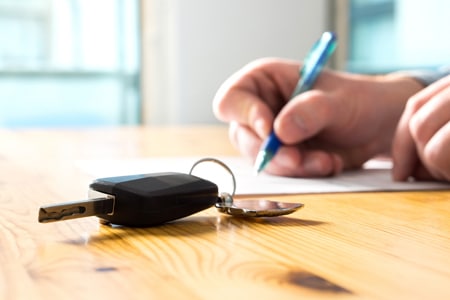How do Car Loans Work – Our Ultimate Guide
Important Note: When you buy through our links, we may earn a commission. As an Amazon Associate we earn from qualifying purchases. Content, pricing, offers and availability are subject to change at any time - more info.
If this is your first time purchasing a car, or you’re curious about how an auto loan works, you have come to the right place. When purchasing a new or used car, you need to be aware of all your choices and pick the best option for your budget and situation.
Advertisement
How Do Car Loans Work? Where do I Look?
There are several options when looking to obtain a car loan. Each has its own pros and cons, depending on your financial situation. Carefully view your options before selecting one, and choose the one that works in your best interest. Remember to consider the loan term, the rate of the monthly payment, and financing methods before you make a decision.
From Your Financial Institution
You can obtain a car loan through your credit union or bank, or you can choose to shop around for the best rate. While it is nice to go with the institution you are familiar with and be able to keep track of everything in one location, your financial institution may not always provide a competitive rate.
It never hurts to check on several locations to see if you are getting the best deal. This way you will know for sure.
This option may appeal to you if you have a pre-existing relationship with your bank, and it may help you obtain a better rate. The benefit is that you are borrowing directly from a financial institution instead of through a third party. This may mean that you can avoid extra fees.
Advertisement
The downside is you may run the risk of begin turned down or offered a higher interest rate if you have poor credit. Therefore, it is best to be aware of all your options.
Through a Car Dealership
You can also secure a car loan through the dealership. It provides the convenience of a “one-stop-shop,” as both the car and loan are received from the same place. The process is also completed during the day if you need a new/used car immediately.
Dealerships also provide offers from various lenders. This means that you will have a few choices in selecting one. They also provide special deals to entice you to take out a loan using their partners.
However, they are not directly giving you money as banks do. Instead, car dealerships broker a deal with other lenders acting as the “middleman” in this transaction. They tend to charge a fee for arranging this process making payments more expensive than bank loans.
How Much Would a Car Loan Cost?
When looking for a car loan, you need to examine APRs across several different institutions to ensure that you are receiving the best rate. Search for lenders that have minimal fees and who have repayment methods that suit your needs and budget.
Here are the best places for car loans. They will provide a rough idea of what to expect:
Advertisement
- PenFed Credit Union (Overall Best Choice)
- Oporun (Good for Bad Credit)
- Capitol One (If you are more comfortable dealing with a big bank)
- Lightstream (For Used Cars, although many of the ones listed will do the same)
- OpenRoad Lending (For Refinancing)
These are the best places to begin your search. You can also go to LendingTree and LendingClub as well for comparisons. The only downside to these sites is that one requires financial and personal details. The other isn’t available in all states and there may be some vehicle restrictions.
How Do I Save Money on a Car Loan?
Finding out how to save money on an auto loan can be challenging. While a car loan with a low monthly payment may look good, over time it can cost you more money. Loans offered will depend on various factors, like your credit score. A poor credit score makes it difficult to obtain the best loan offers.
If you want to save money on a car loan, you can:
- Design your own payment plan. Before completing an application, create a payment plan yourself. Investigate how much you can pay upfront and how much is required for a car loan.
- If you can, look at other options. This applies to both purchasing a car and insurance. Carefully examine all your options prior to making a final decision. You want one that is compatible with your budget. Always read the fine print to ensure you are comparing each offer using the same metrics.
- Provide additional payments to make larger payments. Paying off the loan prior to maturity saves you money because you are avoiding paying interest. If you can afford to pay a bit more each month in addition to regular payments, or suddenly obtain cash, think about paying down the car loan. Make sure you do not receive any penalties prior to doing so.
- Look at refinancing the loan. If you discover a car loan with a lower rate, perhaps your credit score improved! Consider refinancing and switching loans. By lowering your interest rate, you pay less over time.
Does a Car Loan Affect My Car Insurance?
Obtaining a loan to buy a car means you are not the only person with an investment in that car. The lender has a financial investment until the car is fully paid. Therefore, they want to ensure it is protected.
Your lender, or lienholder, is listed with your car insurance policy. They may request that you add additional coverage to the policy to protect the shared investment.
Comprehensive and collision coverage is usually requested to be added to your policy. Comprehensive coverage covers damage that occurs when the vehicle is parked like incidences of fire, hail damage, vandalism, and theft. Collision coverage protects your car in case of an accident regardless of who was at fault.
Gap Insurance Coverage
If you purchased a new car with a car loan, you may want to consider adding gap coverage. In the event the vehicle is stolen or written off, you will not have it. However, this doesn’t mean that your loan disappears!
Advertisement
With this coverage, your insurance covers the “gap” between the actual cash value (ACV) and what is owed. This means that you will not be paying for a car you no longer own.
With the lenders or banks, they will pay the ACV on the car, but it could be less than the loan due to depreciation.
How to File a Claim While on a Car Loan
If, for some unforeseeable reason, you need to file a claim, there are different procedures to follow depending on the lender. Each lender has different requirements and documentation before you receive a cheque. You may need to provide documentation that the money is going to car repairs prior to endorsing a cheque.
Check with the lienholder about what is required prior to receiving a cheque. Always save all documents regarding car repairs. Also, never send in the original document. Send them a copy and save the original one for yourself.
In determining what is best for you, you need to look at what is available. You need to do due diligence before making a vehicle purchase because the last thing you want to do is pay more monthly. It is best to go in educated than to be taken advantage of.




 Please Support Me on Ko-fi
Please Support Me on Ko-fi